|
|
|
Sort Order |
|
|
|
Items / Page
|
|
|
|
|
|
|
| Srl | Item |
| 1 |
ID:
156911


|
|
|
|
|
| Summary/Abstract |
This article investigates empirically the impact of power asymmetry and interest formation in the European Union’s (EU) external relations with third countries in the context of the Europol data exchange and counterterrorism agreements. It focuses on three countries, namely the United States, Turkey, and Morocco, which each have a different level of counterterrorism cooperation with the EU. This article argues that the EU acts as a pragmatic actor with regard to Europol’s data exchange agreements with third countries, and that the power asymmetry between the EU and the third country under question determines the extent of the EU’s flexibility. If the power asymmetry favours the EU, then it insists on its data protection demands. Otherwise, the EU is more flexible towards its counterparts on data protection issues.
|
|
|
|
|
|
|
|
|
|
|
|
|
|
|
|
| 2 |
ID:
148543


|
|
|
|
|
| Summary/Abstract |
The Israeli-Palestinian conflict attracts much scholarly and diplomatic attention. However, despite Secretary of State John Kerry’s determination during the 2014 round of negotiations, the parties are no closer to reaching a negotiated agreement over twenty years after the signing of the Oslo Accords. This article explores an under-examined aspect of negotiation, the decision to enter into talks, using poliheuristic theory. We examine the decision-making calculus of Palestinian president Mahmoud Abbas in his bid for Palestinian statehood at the United Nations, a decision to not negotiate. We ask not only why did Abbas choose to bypass US-mediated negotiations, but why he chose to pursue Palestinian statehood at the UN. In our analysis and discussion, we identify gaps in the existing decision-making and negotiation literatures and ways to better incorporate questions of power asymmetry and the complexity of context into poliheuristic theory.
|
|
|
|
|
|
|
|
|
|
|
|
|
|
|
|
| 3 |
ID:
110781
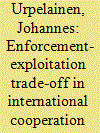

|
|
|
|
|
| Publication |
2011.
|
| Summary/Abstract |
According to the imperative of enforcement, states must threaten defectors with sanctions or reciprocal suspension of international cooperation. I show that in international cooperation between the weak and the powerful, states should nevertheless limit the supply of collective enforcement power. Strong sanctions allow exploitative international agreements, so weak states refuse to engage in negotiations with powerful states in the first place. For powerful states, toothless international agreements are a credible commitment to limit power politics. The result holds even if sanctions can be used only to enforce international agreements and not for coercion. It implies that under power asymmetry, states must accept constraints on the use of power, as opposed to simply maximizing the supply of collective enforcement power. The theory offers a new perspective to international cooperation and a synthesis of the enforcement and managerial schools of international cooperation. It produces precise analytical boundary conditions and generates falsifiable empirical hypotheses.
|
|
|
|
|
|
|
|
|
|
|
|
|
|
|
|
| 4 |
ID:
121727
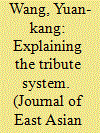

|
|
|
|
|
| Publication |
2013.
|
| Summary/Abstract |
In this article I remedy the popular misconception that the East Asian international system was hierarchical and non-egalitarian in history. I argue that the tribute system is mainly a function of power. Backed by power, Confucian norms and rules became the rules of the game in the system. Power asymmetry gave rise to hierarchy in foreign relations while power symmetry led to diplomatic equality between great powers. East Asia during the tenth to the thirteenth centuries was a multistate system without a regional hegemon. In the Song-Liao international system (960-1125), due to power symmetry, the two great powers conducted their foreign policy on the basis of formal equality. In the Song-Jin international system (1127-1234), the weaker Song China became a Jin vassal state and acknowledged its inferior status in the Jin-derived hierarchy. In studying historical East Asia, Confucian rhetoric needs to be examined against power reality. Only by taking power seriously can we get a better understanding of the East Asian international system.
|
|
|
|
|
|
|
|
|
|
|
|
|
|
|
|
| 5 |
ID:
177665
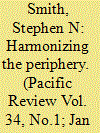

|
|
|
|
|
| Summary/Abstract |
This paper investigates how Chinese elites understand the proper role of their nation vis-à-vis its ‘periphery’ and how this self-understanding shapes Chinese strategic policy toward neighboring states. It makes two specific arguments. First, after 2012 China began to understand itself as responsible for actively managing and shaping its periphery. Xi Jinping has overseen an evolution in China’s neighborhood strategy that has changed from mere engagement to proactive efforts to shape regional order. Efforts to achieve this goal have come primarily through: institution-building and regional integration via the ‘Belt and Road Initiative’, strategic partnerships, normative binding, and developmental statecraft. Second, managing newly emerged power asymmetries between China and its neighbors is now a crucial task of Beijing’s peripheral policy. The emerging China-led regional order relies on norms that are hierarchical, transactional, and reflect status distinctions. Xi Jinping’s neighborhood strategy rests on an asymmetric bargain: respect China’s core interests in exchange for benevolence.
|
|
|
|
|
|
|
|
|
|
|
|
|
|
|
|
| 6 |
ID:
127774
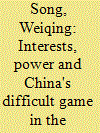

|
|
|
|
|
| Publication |
2014.
|
| Summary/Abstract |
The Shanghai Cooperation Organization (SCO)-an organization interpreted in various ways-officially announced that it intended to ensure regional security by countering international terrorism, ethnic separatism and religious extremism. This article discerns the motivations of the SCO members, arguing that they have their respective, albeit occasionally mutual, interests and priorities. There is generally asymmetry of interests-the principal reason why the SCO's strategic situation is largely a suasion game between China and the members-with China demonstrating a greater interest in the SCO; moreover, the power asymmetry between China and the Central Asian members and the power equality between China and Russia further complicates the situation. This sophisticated relationship implies that despite some measurable results, the SCO faces tremendous challenges in becoming a well-established regional organization.
|
|
|
|
|
|
|
|
|
|
|
|
|
|
|
|
| 7 |
ID:
091733


|
|
|
| 8 |
ID:
160865


|
|
|
|
|
| Summary/Abstract |
Humanitarian actors seeking to offer assistance and protection to civilians in many contemporary conflicts negotiate access with armed groups from a position of weakness. They consequently concede many of their demands, compromising humanitarian operations and principles, and leaving millions of vulnerable civilians beyond reach. Using a structural analysis of the negotiation process in many recent humanitarian crises this article demonstrates the basis of this marked power asymmetry and challenges the assumption in much of the literature that this power imbalance is immutable. Humanitarian negotiators have access to a range of tactics that can alter the structure of the negotiation to reach more favorable outcomes. This article argues that these strategies have proved effective in many recent negotiations, but also carry significant risks to humanitarian actors and to the civilians they seek to assist.
|
|
|
|
|
|
|
|
|
|
|
|
|
|
|
|
| 9 |
ID:
141713
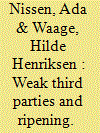

|
|
|
|
|
| Summary/Abstract |
Can weak third parties contribute to ripening conflicts for resolution despite their lack of leverage? According to the core principles of ripeness theory, mediators with leverage have a clear advantage when it comes to ripening. What is often overlooked in the literature, however, is the important ways a weak mediator can contribute to ripening as well. This article explores two noteworthy cases of weak third party ripening – the Norwegian roles in the Oslo channel between Israel and the Palestinians, and between the URNGguerrilla and the government in Guatemala. These cases demonstrate how careful interventions by weak third parties can help disputants see negotiations as a way out both in preliminary and later phases of negotiations. However, we also argue that weak third parties should not get involved in ripening unless they can call on a mediator with more leverage once substantial negotiations begin.
|
|
|
|
|
|
|
|
|
|
|
|
|
|
|
|
|
|
|
|
|